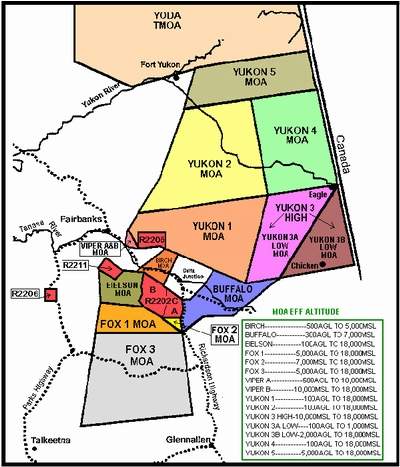Tue, May 13, 2003
Dependable, Yet Solar/Wind Powered
The US Air Force has decided to use ARINC to develop two remote
Very High Frequency (VHF) air/ground radio stations in central
Alaska. The project will improve voice communications over two
sections of the Air Force's huge Pacific Alaskan Range Complex
(PARC), which covers some 67,000 square miles.

Because electricity is not available, the facilities will need
to include alternative energy sources-either wind or solar-to power
the transmitting and receiving electronics.
One of the new VHF station locations has been specified by the
Air Force: Snowy Peak, located north of the Yukon River about 150
miles east of Fairbanks. The station at this site will improve
radio coverage of the Yukon MOA. The second station will serve the
Fox MOA, about 100 miles south of Fairbanks. The precise location
for the second transceiver station will be determined after
engineering surveys. One or more repeater stations may also be
needed to relay signals to the new remote sites.
"ARINC is proud to help the Air Force add new, reliable radio
coverage that will extend their communications envelope," stated
Walter "Bud" Elsaesser of ARINC Global Maintenance Services. "We
have designed and installed more than 1,000 air/ground radio
stations around the world, including stations on Russian
mountaintops using solar electric power and deep cycle batteries
for year-round operation."

Creating An Alaskan Comm Network
The new stations will join four older VHF air/ground radio
facilities on a network operated by the 353rd Combat Training
Squadron at Eielson Air Force Base outside Fairbanks. One of
ARINC's subcontractors for the work is Alaska Weather Operations
Services, Inc.

"We have a long and successful relationship with Alaska Weather
Operations Services," stated Mr. Elsaesser. "AWOS provides
maintenance and installation as well as shelter construction for
our varied needs in Alaska. Their local knowledge and proven
environmental concern, as well as their history of shelter
construction for the Alaska environment are unrivaled."
Alaska has more private and small commercial aviators per capita
than any other state, and maintaining the safety of flight during
military exercises is an important consideration. When air and
ground exercises are held at PARC, the Air Force's VHF voice radio
system broadcasts advisories and provides aircraft position
information for both military and civilian aircraft.
More News
From 2023 (YouTube Edition): "Ain’t Your Daddy’s Super Cub”—Don Wade Co-owned by Don and Ron Wade—the former of Don’s Dream Machines, a storied >[...]
Pilot-Rated Passenger Reported That The Pilot Did Not Adequately “Round Out” The Landing Flare And The Airplane Bounced And Yawed To The Right Analysis: The pilot state>[...]
Dead Reckoning Dead reckoning, as applied to flying, is the navigation of an airplane solely by means of computations based on airspeed, course, heading, wind direction, and speed,>[...]
Aero Linx: Lake Amphibian Club This website is created and sponsored by the Lake Amphibian Club, to help spread the word about these wonderful, versatile amphibians that can land j>[...]
“I am deeply honored to be sworn in as NASA administrator. NASA’s mission is as imperative and urgent as ever — to push the boundaries of human exploration, ignit>[...]
 Classic Aero-TV: In Praise of Alabamas Patriot Aircraft USA
Classic Aero-TV: In Praise of Alabamas Patriot Aircraft USA NTSB Final Report: Cirrus Design Corp SR22
NTSB Final Report: Cirrus Design Corp SR22 ANN's Daily Aero-Term (12.21.25): Dead Reckoning
ANN's Daily Aero-Term (12.21.25): Dead Reckoning ANN's Daily Aero-Linx (12.21.25)
ANN's Daily Aero-Linx (12.21.25) Aero-News: Quote of the Day (12.21.25)
Aero-News: Quote of the Day (12.21.25)




